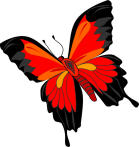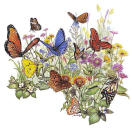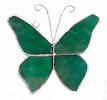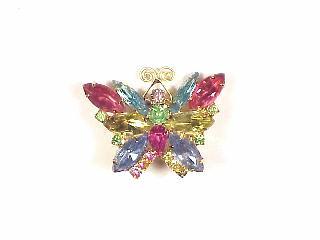 Some
of you may be familiar with "The
Butterfly Effect" usually attributed to Edward
Lorenz. The theory (simply put) is that a
butterfly flapping its wings in Tahiti can produce a tornado in Kansas.
Also known as the Chaos Theory, and discussed by Leibniz as early as the 17th
century, it arises when a system is unusually sensitive to its initial conditions
so that a small disturbance of the system changes each subsequent behavior in
a way that grows exponentially with time. Probably the most famous example of chaos,
however, is this so-called "butterfly
effect", suggesting that the tiny air disturbance from the flapping of a
butterfly's wings (or any seemingly insignificant event) can ultimately lead
to a powerful and unpredictable change -- dramatic consequences. Over the past
two weeks, I, for one, have become intrigued by this theory.
Some
of you may be familiar with "The
Butterfly Effect" usually attributed to Edward
Lorenz. The theory (simply put) is that a
butterfly flapping its wings in Tahiti can produce a tornado in Kansas.
Also known as the Chaos Theory, and discussed by Leibniz as early as the 17th
century, it arises when a system is unusually sensitive to its initial conditions
so that a small disturbance of the system changes each subsequent behavior in
a way that grows exponentially with time. Probably the most famous example of chaos,
however, is this so-called "butterfly
effect", suggesting that the tiny air disturbance from the flapping of a
butterfly's wings (or any seemingly insignificant event) can ultimately lead
to a powerful and unpredictable change -- dramatic consequences. Over the past
two weeks, I, for one, have become intrigued by this theory.
A small "DISTURBANCE" of the system we call Mother Earth occurred on February
1st, 1927, (in
Seattle, WA), when my mother, Jean Marie Lande was born, and most of
us know the dramatic, exponentially growing consequences that resulted (and
will continue to do so). The second child (and first daughter) born to
my grandparents, Clarence Oliver and Adelia
Babcock Lande,
my mother grew up on a farm where she led a relatively care-free existence and
spent much of her time on horseback.
Her father (or my grandfather) was a first-generation
Norwegian immigrant who grew up in North Dakota, graduated from college,
and went on to receive a law degree, though he never practiced law after
coming to Seattle.
My mother's mother also graduated from college, but she grew up in
Montana and was chosen by Teddy Roosevelt  to
break wild horses for the U.S. cavalry during WW I, when she was a
young girl. She was an original "HORSE
WHISPERER". My mother's grandfather counted Buffalo Bill
and Annie Oakley among his friends, and he had a "wild west" show
of his own.
to
break wild horses for the U.S. cavalry during WW I, when she was a
young girl. She was an original "HORSE
WHISPERER". My mother's grandfather counted Buffalo Bill
and Annie Oakley among his friends, and he had a "wild west" show
of his own.
My mother's parents set education as a top priority, and all three children
had a passion for learning. My mother often told me that the highlight of
her childhood were the day-long, weekly trips to the library.
Some of my mother's best childhood friends were Japanese immigrants, some
of whom worked on their farm and others who lived in her neighborhood. One
day her Japanese friends disappeared, sent to US internment camps with little
to no warning. This injustice was one of many that affected my mother deeply.
Jean Lande thrived in high school, studying civics and math (the only girl
to be in the most advanced math class), and she loved the debate team. She
was then the first person from her high school to take the College Boards (now
known as SATs). Most of her classmates did not even consider going to college,
but my mother chose Vassar. Though she'd never seen Vassar and knew little
about it, the mother of her friend, Joan, had graduated from there and encouraged
Mom to apply. And so, on August 25th, 1945, my mother and Joan boarded the
train for Poughkeepsie, NY making my mother the first member of her family
to travel East of the Mississippi. When the taxi pulled up to the grand,
rose-covered brick entrance to Vassar College, my mother experienced another
first: This pivotal life-changing moment -- arriving at Vassar College --
was heralded by her first-ever violent, electrical storm, and she was in
awe of Mother Nature's
ovation.
It took my mother some time to become accustomed to Vassar and the
East Coast society girls she encountered there. She also felt that
her high school hadn't prepared her as well as she'd hoped (or needed).
An entry in her diary from September of 1945 sounds like it could
have been written by her earlier this year -- "I am systematizing my work and if I will obey a schedule I may get organized. As it is I am way behind and seem to waste so much time in procrastinating." Some
things clearly didn't change.
My mother rather quickly decided
that she'd only spend one year at Vassar, as it was too far away
from home and she missed her family terribly. Soon after my mother
arrived at Vassar, the Dean of Students (feeling a bit sorry for
this girl so far from home) set her up to have dinner with the "other girl from the West". My mother loved to tell the story of how the other western girl was from Pittsburgh!
 Mom
worked hard and grew to love Vassar for its first-rate education and
the fascinating, motivated women she met there. She even convinced her
younger sister, Doris, to apply the next year. With a major in political
science, Mom enjoyed debating politics (surprisingly, she was a Republican
at the time!)
Mom
worked hard and grew to love Vassar for its first-rate education and
the fascinating, motivated women she met there. She even convinced her
younger sister, Doris, to apply the next year. With a major in political
science, Mom enjoyed debating politics (surprisingly, she was a Republican
at the time!)
In her sophomore year, a handsome man (in uniform) came to visit his sister
(who lived on Mom's floor at Vassar).
She was introduced to this soldier, and my mother never took another look
at any other man. A year and a half later (she was on the 3-year plan),
she graduated from Vassar (and the soldier -- our father) graduated from
Princeton. Very soon after, they were married in the Shakespeare Garden
on the Vassar campus. Sometime later my mother told a dear friend from home: Some
of us marry well: We are allowed the freedom to be ourselves. ![]()
My brother, John and I were born while my father was completing
his doctorate at the University of Washington, so Mom had a few
more years living in Seattle, which she loved. In 1957, we moved
to Hanover, and each winter she reminded us of how "CIVILIZED" winters
were in the Pacific Northwest. But she grew to love NH with a
passion and soon it was clearly her destiny and her home. She certainly
kept busy - cleaning the Connecticut River, saving Franconia
Notch, and generally creating much-needed chaos in
the State (and, indeed, in the Nation).
During a large part of my early years I assumed that my mother
was fundamentally like others. Of course, early on, I also knew
there were dramatic ways in which she was NOT typical: I assumed
that all fathers and mothers shared household duties, for example.
In elementary  school,
I remember being confused by the way the other children always said
that their MOTHERS had made their lunches for school, as my father had always
made mine. As a teenager, I heard that it was typical for mothers to
tell their daughters that they were too young to shave their legs, and I braced
myself for the same reply from my mother when I received my first invitation
to a coed pool party (at the Epplys'). Instead, my mother looked
me squarely in the eyes and said, "Before you decide to shave your legs, you'd
better think hard about whether you're doing it because YOU want smooth, shiny
legs or because you believe that BOYS like smooth, shiny legs. If you're going
to do it, do it because it's how YOU want to look." In
this (seemingly insignificant) three-minute conversation,
my mother made an important and timely point that gave me pause. Over
the years, the value of her message grew exponentially, helping
me to challenge my instinct to conform and, in fact, making me a better
mother of my own teenage girls. It wasn't until I left
home that I realized that some people treated those who worked in their
homes differently than they treated friends and family. Every person who
came into our house was treated with the same dignity. It didn't matter
if he/she were running for president or vacuuming the floor when the party
was over. In fact, my mother had a way of seeing the potential in all
people. It was hard for her to keep a good secretary, for example, because
she'd inevitably look for ways to help them move on to higher level jobs.
If her secretary hadn't finished college, Mom might find a way to get
funding so that she could finish her degree. She believed in having dreams
and pursuing them -- not just for herself, but for those who had
been less fortunate or whose dreams had been stifled somewhere along
the way.
school,
I remember being confused by the way the other children always said
that their MOTHERS had made their lunches for school, as my father had always
made mine. As a teenager, I heard that it was typical for mothers to
tell their daughters that they were too young to shave their legs, and I braced
myself for the same reply from my mother when I received my first invitation
to a coed pool party (at the Epplys'). Instead, my mother looked
me squarely in the eyes and said, "Before you decide to shave your legs, you'd
better think hard about whether you're doing it because YOU want smooth, shiny
legs or because you believe that BOYS like smooth, shiny legs. If you're going
to do it, do it because it's how YOU want to look." In
this (seemingly insignificant) three-minute conversation,
my mother made an important and timely point that gave me pause. Over
the years, the value of her message grew exponentially, helping
me to challenge my instinct to conform and, in fact, making me a better
mother of my own teenage girls. It wasn't until I left
home that I realized that some people treated those who worked in their
homes differently than they treated friends and family. Every person who
came into our house was treated with the same dignity. It didn't matter
if he/she were running for president or vacuuming the floor when the party
was over. In fact, my mother had a way of seeing the potential in all
people. It was hard for her to keep a good secretary, for example, because
she'd inevitably look for ways to help them move on to higher level jobs.
If her secretary hadn't finished college, Mom might find a way to get
funding so that she could finish her degree. She believed in having dreams
and pursuing them -- not just for herself, but for those who had
been less fortunate or whose dreams had been stifled somewhere along
the way.
 When
my mother died unexpectedly on June 9th (in the midst
of an extraordinary
When
my mother died unexpectedly on June 9th (in the midst
of an extraordinary  electrical
storm outside her window), my personal loss was overwhelming.
Of course, my entire family felt the same way. My brother
and I had lost our mother, my children had lost their
cherished grandmother, and my father had lost his very
best friend -- a fundamental part of himself. What I
didn't realize at the time, however, was the degree
to which her life had affected so many, MANY others
... some I've never known.
electrical
storm outside her window), my personal loss was overwhelming.
Of course, my entire family felt the same way. My brother
and I had lost our mother, my children had lost their
cherished grandmother, and my father had lost his very
best friend -- a fundamental part of himself. What I
didn't realize at the time, however, was the degree
to which her life had affected so many, MANY others
... some I've never known.
We knew that she was a well-known political force ... the "Doyenne" of
NH Democratic politics, if you will ...
but my family and I have been awakened to another
dimension. In the past two weeks, we have received many
wonderful notes and phone calls from those who want us to know
how she has changed their lives -- by showing an interest in
them, believing in them, or by helping them to believe in themselves.
We simply had no way of knowing the breadth of her reach or the
exponential effects of her individual decisions or actions __
 My
mother's butterfly effect.
My
mother's butterfly effect.

She rarely gave herself enough credit or sang her own praises.
In fact, Mom was quick to laugh off or shun accolades of all sorts.
Some of her many public accomplishments were outlined in the obituaries.
As you can imagine, however, her resume paints only a small part
the full picture.
My mother often hired Dartmouth undergraduates (usually women) to
do all sorts of work for and with her. Some are in the chapel today.
One of her earlier students, Lisa Quirk Kaija,
spent an enormous amount of time with my mother over her years at Dartmouth.
Another, Anne Downey, was a bit later. Later still came Katie Stiff.
Of course, these are just a few. The other day we heard from a student
who is now living in Russia and wanted us to know how much she learned
from working with my mother.
I'd like to read just a sample of some of the notes from former students
who worked with her: ![]()
